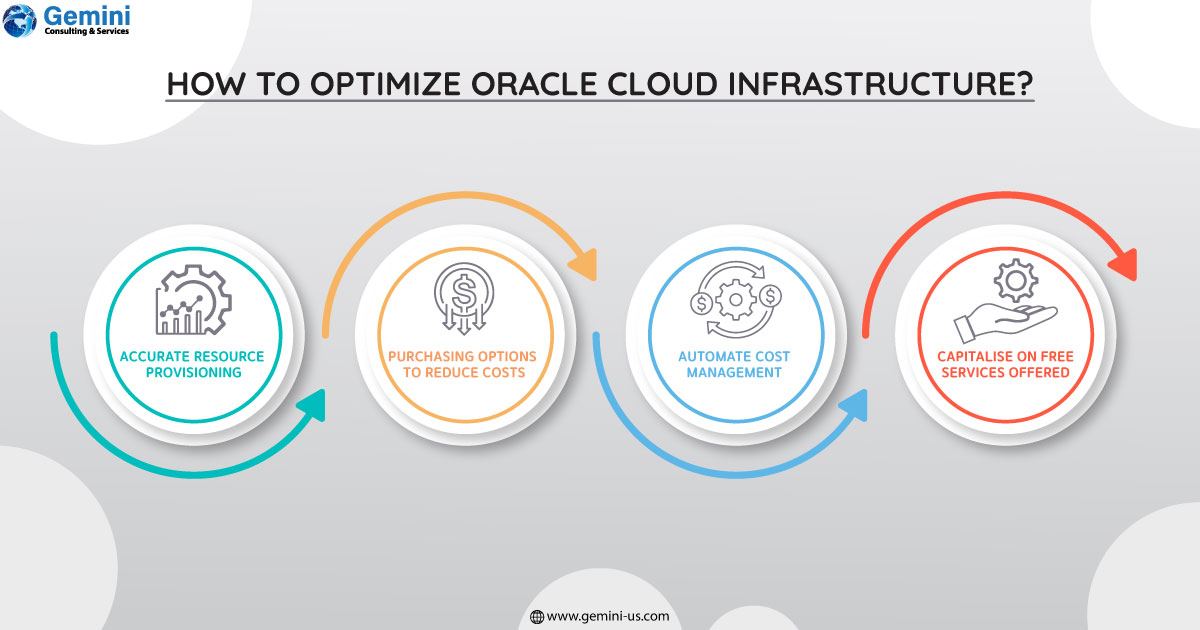Gen 2 Cloud from Oracle makes it easier for enterprises to scale their operations. It also enables them to move any enterprise application to the public cloud. Oracle used core innovation to overcome the limitations of other cloud companies. It built performance and control systems that automate and deliver services cost-effectively.
Oracle offers a flexible cloud infrastructure that can optimize resources as per customer needs, without rewriting software. It offers custom memory and adaptive block storage that shifts from economical to high I/O Operations Per Second (IOPS) as needed along with flexible network load balancing that adapts to demand. As a result of this innovation, migrating entire environments can happen in just a few weeks.

How Can Businesses Manage Costs?
Designing a cost-effective public cloud solution for Oracle software workloads can be tricky for businesses as they need to compute costs in line with the high cost of Oracle licenses. Making the choice between the right platform and architecture to minimize costs needs an analysis of the cost for cloud resources and that of licensing combined with one-time costs such as refactoring and migration. Handling the costs of the Oracle Cloud also means paying attention to the governance aspect.
Cloud governance is a set of rules and processes that are created and monitored to control costs, improve efficiency, and eliminate security risks. Cloud migration involves planning and implementing security controls for protection and detection. The governance model lists a clear structure to design and improve cloud security, ensure compliance, and reduce costs.
Here is what governance indicates.
- Establish visibility on all the cloud resources paying close attention to underutilized resources, security lapses, and unused capacity.
- Cost management by defining service limits, budgets, and usage quotas in the cloud and leveraging audit services to always ensure compliance.
- Improve security by creating and authenticating policies and tailoring them to business needs.
A chunk of the OCI costs lies between virtual machine sizes both IaaS and PaaS, the relevant licenses, and the storage part spend. Other costs include load balancing, WAF, and email services. There are unpredictable usage elements like VPNs, NAT gateways, or Load Balancers because their charges are constructed two-fold – service charges and data processing charges. This makes estimation difficult. However, with Oracle cloud migration, service charges for all gateways and data processing charges for elements like Load Balancers get eliminated. There is a fixed amount of general data egress that is free up to a particular limit (free over Fast Connect) ensuring that the BoM cost sticks close to the actual cloud bill. By accurately sizing VMs, businesses can handle cloud costs.
During initial cloud migration, teams usually spin up infrastructure for testing owing to a late requirement or if the DBAs want to just have a peek at a PaaS instance. This can be controlled by setting about hard and soft service limits.
While OCI administrators control the soft service limits that are set within the Oracle cloud console, hard limits are set by the company itself. The hard and soft limits to control general infrastructure over-provisioning can be programmed using OCI budgets. These budgets allow businesses to set a monthly spending limit along with an alert threshold to send an email alert when the limit is breached. Budgets can also be set at compartments (logical resource containers) or tags to ensure that there is enough flexibility for all use cases.
To manage workloads on Oracle Cloud Infrastructure (OCI) efficiently, enterprises must select a cost optimization strategy. The ultimate objective of Oracle Cloud cost optimization is to bring down the cost of running applications and services on the cloud while conforming to performance and availability requirements.
Cloud cost optimization is no doubt very important to plan and manage workloads on OCI. A person who can manage business workloads on Oracle cloud in a systematic and efficient manner is called a qualified Oracle Cloud Managed Services Provider (MSP). Managing workloads post-migration requires expertise and Gemini Consulting & Services has a deep understanding of the Oracle Cloud Infrastructure. Contact us to get the right tools and strategy to optimize your Oracle cloud environment.

- Accurate Resource Provisioning
It is crucial to properly size compute, storage, and network resources to match the requirements of business workloads. When resources are overprovisioned, it leads to wasted costs due to unused or underutilized resources. Likewise, they are undersized, and performance and availability may be impacted.
- Purchasing Options to Reduce Costs
OCI offers several purchasing options that help bring down costs. For instance, the Reserved Instance (RI) model allows a business to block or reserve compute resources for a one- or three-year term. This results in significant cost savings in comparison to On-Demand instances. The Bring Your Own License (BYOL) model allows teams to use existing software licenses in the cloud, reducing the cost of running software on OCI.
- Automate Cost Management
OCI provides option to help automate cost management with its management and billing feature. With this service, teams can set up alerts to be notified when spending exceeds a specified threshold, receive cost reports, and accordingly analyze cost and usage trends to help identify the slightest potential for Oracle cloud cost optimization.
- Capitalise on Free Services Offered
Several services such as the Object Storage service and the Load Balancer service are offered free of cost by Oracle. These services can help businesses reduce costs and improve the overall efficiency of the infrastructure. The Object Storage service provides low-cost, scalable, and durable object storage that can be used for multiple use cases such as storing backups, data archives, and media files.



